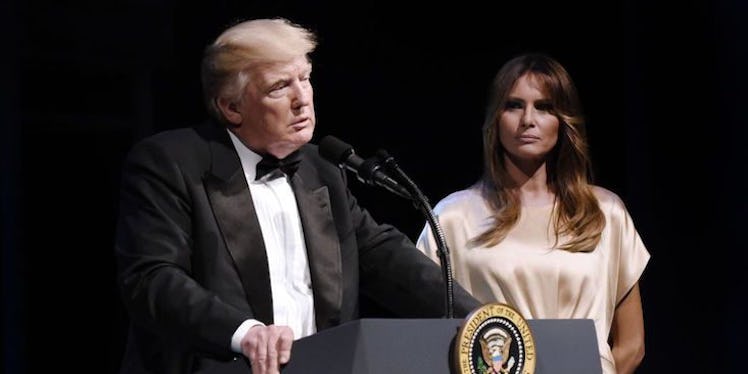
This Is Why President Donald Trump's Tweets Actually Do Matter
President Donald Trump's tweets seem to be a constant topic of conversation these days.
In this past week alone, the president generated headlines (and laughter) with his infamous "covfefe" tweet and caused an uproar when he attacked London Mayor Sadiq Khan by completely misconstruing what he said in the wake of Saturday's terror attack.
There are some who might urge you to view Trump's use of Twitter as a distraction from his agenda and the chaos surrounding his administration.
Meanwhile, the White House has continuously defended Trump's use of Twitter and attempted to diminish the consequences of his tweets.
On Monday, Kellyanne Conway criticized the media for its "obsession" with Trump's tweets and for covering "very little of what he does as president."
But Trump is tweeting as the president, and his tweets are public statements that represent the country and often pertain to his policies.
In other words, Trump's tweets matter, and could have consequences for everyone -- including him.
Trump has used Twitter to attack the free press, condemn the judiciary, insult international allies, and even to endorse or condemn specific companies.
The president of the United States is the leader of the most powerful country on the planet, and his or her words have consequences — regardless of the context.
When the president's words undermine American values, hurt its relationships with other countries, or cross ethical lines, it matters.
Not to mention, every single tweet Trump sends, whether from his personal account (@realDonaldTrump) or his official White House account (@POTUS), are preserved as presidential records, even if they've been deleted.
This is due to the Presidential Records Act of 1978, a law that requires all presidential writings to be preserved.
In other words, every single one of Trump's tweets is a piece of history.
Trump's tweets on his "travel ban" could come back to haunt him.
On Monday morning, Trump sent a number of tweets that could complicate his administration's efforts to get the Supreme Court to approve his temporary ban on travel from a number of predominately Muslim countries.
Due to the language he used on the campaign trail, Trump's executive order, which many refer to as a "Muslim ban," has met consistent legal obstacles.
During his campaign, Trump called for banning all Muslims from entering the United States, citing concerns about terrorism.
As president, Trump softened his tone but still attempted to issue an executive order that would temporarily bar travel from seven predominantly Muslim countries, while indefinitely banning the entry of Syrian refugees.
This was met with widespread public outcry and ultimately got held up in federal courts, prompting the Trump administration to issue a revised version of the executive order, which was slightly less harsh and included fewer countries (Iraq was taken off the list).
But this also ended up getting held up in federal courts.
In late May, the Fourth Circuit Court of Appeals in Richmond, Virginia, refused to reinstate the revised immigration order.
Chief Judge Roger L. Gregory argued for the majority there was "ample evidence" to show that national security was "not the true reason" for the revised travel ban.
He said,
Trump's campaign statements reveal that on numerous occasions, he expressed anti-Muslim sentiment, as well as his intent, if elected, to ban Muslims from the United States.
The judge also cited statements from Trump's advisers that argued the revised executive order had the “the same basic policy outcomes for the country" as the initial one.
So, we've already seen how much of an impact the words of Trump and those associated with him can have on policy.
Trump contradicted his own team with his tweets.
The White House has attempted to argue the executive order is not a "Muslim ban" and is not a "travel ban," but more of a "temporary pause" for travelers from six countries (which happen to be predominately Muslim). That language would make it more likely pass through the courts.
On May 28, Homeland Security Secretary John Kelly referred to it as a "travel pause" not a "travel ban," reiterating a stance he'd previously taken.
But, in his tweets, Trump explicitly referred to the executive order as a "travel ban" and even attacked his own team at the Department of Justice when he said,
The Justice Dept. should have stayed with the original Travel Ban, not the watered down, politically correct version they submitted to.
Given Trump's words were already held against him in federal courts in relation to the executive order, it's conceivable his tweets could undermine his efforts in the Supreme Court.
By tweeting the revised executive order is indeed a "travel ban" that is also too "politically correct" for his tastes, Trump has arguably revealed his true intentions were always to implement a full-blown Muslim ban.
Even Kellyanne Conway's husband, conservative lawyer George Conway (who recently removed his name from consideration for a Department of Justic job), argued Trump's "travel ban" tweets were unwise from a legal standpoint.
Regardless of what people like Kellyanne Conway or Sean Spicer might argue, tweets from Trump are statements from the president, and can potentially be used against him.
This is precisely why Trump's lawyers and aides have reportedly begged him to stop tweeting.
Clearly, he hasn't listened.
Trump sees Twitter as an asset and a direct line of communication with the public. But his tweets could end up being his worst enemy.